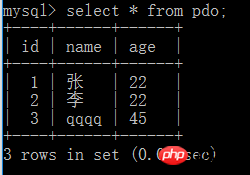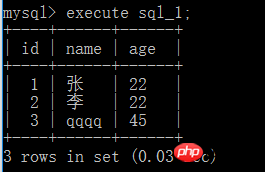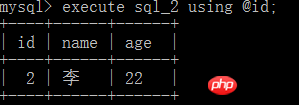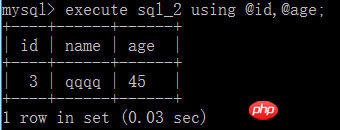 Database
Database
 Mysql Tutorial
Mysql Tutorial
 What is preprocessing technology in MySQL? Use of pre-processing techniques
What is preprocessing technology in MySQL? Use of pre-processing techniques
What is preprocessing technology in MySQL? Use of pre-processing techniques
The content of this article is to introduce to you what is MySQL preprocessing technology? Use of preprocessing techniques. It has certain reference value. Friends in need can refer to it. I hope it will be helpful to you.
The so-called preprocessing technology was originally proposed by MySQL as a technology to reduce server pressure!
Traditional mysql processing process
1, Prepare the sql statement on the client
2, Send the sql statement to the MySQL server
3, Execute on the MySQL server The sql statement
4, the server returns the execution result to the client
In this way, each sql statement is requested once, and the mysql server will receive and process it once. When a script file requests the same statement When executed repeatedly many times, the pressure on the MySQL server will increase, so MySQL preprocessing occurs to reduce the pressure on the server!
Basic strategy for preprocessing:
Forcibly divide the sql statement into two parts:
The first part is the same command and structure part as before
The second part is the variable data part that follows
When executing the sql statement, first send the same command and structure part to the MySQL server, and let the MySQL server perform preprocessing in advance (The sql statement is not actually executed at this time). In order to ensure the structural integrity of the sql statement, the variable data part of the sql statement is represented by a data placeholder when the sql statement is sent for the first time! Like a question mark? It’s a common data placeholder!
There are two forms in MySQL preprocessing: preprocessing with parameters/preprocessing without parameters
1. Preprocessing without parameters
First check the data in the table!

1. Prepare prepared statements
prepare Statement name from “ Preprocessed sqlstatement”;
prepare sql_1 from "select * from pdo";

2, execute the preprocessed statement
execute Statement name;
execute sql_1;

3. Delete preprocessing
drop prepare Statement name;
drop prepare sql_1;

After deletion, preprocessing can no longer be performed Statement!

2. Preprocessing with parameters
1. Prepare prepared statements
prepare Statement name from “Preprocessed sqlstatement”;
prepare sql_2 from "select * from pdo where id = ?";

2. Define parameter variables
set @Variable name = value; --The @ here is a grammatical form for defining variables in MySQL (analogous to the $ symbol in php)
set @id=2;

3. Pass parameter variables and execute the prepared statement
execute Statement name using Parameter variable;
execute sql_2 using @id; --选出id=2的信息

4. Delete preprocessing
drop prepare Statement name;
drop prepare sql_2;

##Note: If there is more than one data placeholder, just pass the parameters in the order of the data placeholders:
prepare sql_2 from "select * from pdo where id > ? && age > ?";

set @id=2; set @age=30;

execute sql_2 using @id,@age;
Note that the unknown parameters here should correspond to the placeholders in step one

The above is the detailed content of What is preprocessing technology in MySQL? Use of pre-processing techniques. For more information, please follow other related articles on the PHP Chinese website!

Hot AI Tools

Undresser.AI Undress
AI-powered app for creating realistic nude photos

AI Clothes Remover
Online AI tool for removing clothes from photos.

Undress AI Tool
Undress images for free

Clothoff.io
AI clothes remover

Video Face Swap
Swap faces in any video effortlessly with our completely free AI face swap tool!

Hot Article

Hot Tools

Notepad++7.3.1
Easy-to-use and free code editor

SublimeText3 Chinese version
Chinese version, very easy to use

Zend Studio 13.0.1
Powerful PHP integrated development environment

Dreamweaver CS6
Visual web development tools

SublimeText3 Mac version
God-level code editing software (SublimeText3)

Hot Topics
 1666
1666
 14
14
 1425
1425
 52
52
 1328
1328
 25
25
 1273
1273
 29
29
 1253
1253
 24
24
 Laravel Introduction Example
Apr 18, 2025 pm 12:45 PM
Laravel Introduction Example
Apr 18, 2025 pm 12:45 PM
Laravel is a PHP framework for easy building of web applications. It provides a range of powerful features including: Installation: Install the Laravel CLI globally with Composer and create applications in the project directory. Routing: Define the relationship between the URL and the handler in routes/web.php. View: Create a view in resources/views to render the application's interface. Database Integration: Provides out-of-the-box integration with databases such as MySQL and uses migration to create and modify tables. Model and Controller: The model represents the database entity and the controller processes HTTP requests.
 MySQL and phpMyAdmin: Core Features and Functions
Apr 22, 2025 am 12:12 AM
MySQL and phpMyAdmin: Core Features and Functions
Apr 22, 2025 am 12:12 AM
MySQL and phpMyAdmin are powerful database management tools. 1) MySQL is used to create databases and tables, and to execute DML and SQL queries. 2) phpMyAdmin provides an intuitive interface for database management, table structure management, data operations and user permission management.
 MySQL vs. Other Programming Languages: A Comparison
Apr 19, 2025 am 12:22 AM
MySQL vs. Other Programming Languages: A Comparison
Apr 19, 2025 am 12:22 AM
Compared with other programming languages, MySQL is mainly used to store and manage data, while other languages such as Python, Java, and C are used for logical processing and application development. MySQL is known for its high performance, scalability and cross-platform support, suitable for data management needs, while other languages have advantages in their respective fields such as data analytics, enterprise applications, and system programming.
 Solve database connection problem: a practical case of using minii/db library
Apr 18, 2025 am 07:09 AM
Solve database connection problem: a practical case of using minii/db library
Apr 18, 2025 am 07:09 AM
I encountered a tricky problem when developing a small application: the need to quickly integrate a lightweight database operation library. After trying multiple libraries, I found that they either have too much functionality or are not very compatible. Eventually, I found minii/db, a simplified version based on Yii2 that solved my problem perfectly.
 Laravel framework installation method
Apr 18, 2025 pm 12:54 PM
Laravel framework installation method
Apr 18, 2025 pm 12:54 PM
Article summary: This article provides detailed step-by-step instructions to guide readers on how to easily install the Laravel framework. Laravel is a powerful PHP framework that speeds up the development process of web applications. This tutorial covers the installation process from system requirements to configuring databases and setting up routing. By following these steps, readers can quickly and efficiently lay a solid foundation for their Laravel project.
 Solve MySQL mode problem: The experience of using the TheliaMySQLModesChecker module
Apr 18, 2025 am 08:42 AM
Solve MySQL mode problem: The experience of using the TheliaMySQLModesChecker module
Apr 18, 2025 am 08:42 AM
When developing an e-commerce website using Thelia, I encountered a tricky problem: MySQL mode is not set properly, causing some features to not function properly. After some exploration, I found a module called TheliaMySQLModesChecker, which is able to automatically fix the MySQL pattern required by Thelia, completely solving my troubles.
 Explain the purpose of foreign keys in MySQL.
Apr 25, 2025 am 12:17 AM
Explain the purpose of foreign keys in MySQL.
Apr 25, 2025 am 12:17 AM
In MySQL, the function of foreign keys is to establish the relationship between tables and ensure the consistency and integrity of the data. Foreign keys maintain the effectiveness of data through reference integrity checks and cascading operations. Pay attention to performance optimization and avoid common errors when using them.
 Compare and contrast MySQL and MariaDB.
Apr 26, 2025 am 12:08 AM
Compare and contrast MySQL and MariaDB.
Apr 26, 2025 am 12:08 AM
The main difference between MySQL and MariaDB is performance, functionality and license: 1. MySQL is developed by Oracle, and MariaDB is its fork. 2. MariaDB may perform better in high load environments. 3.MariaDB provides more storage engines and functions. 4.MySQL adopts a dual license, and MariaDB is completely open source. The existing infrastructure, performance requirements, functional requirements and license costs should be taken into account when choosing.



